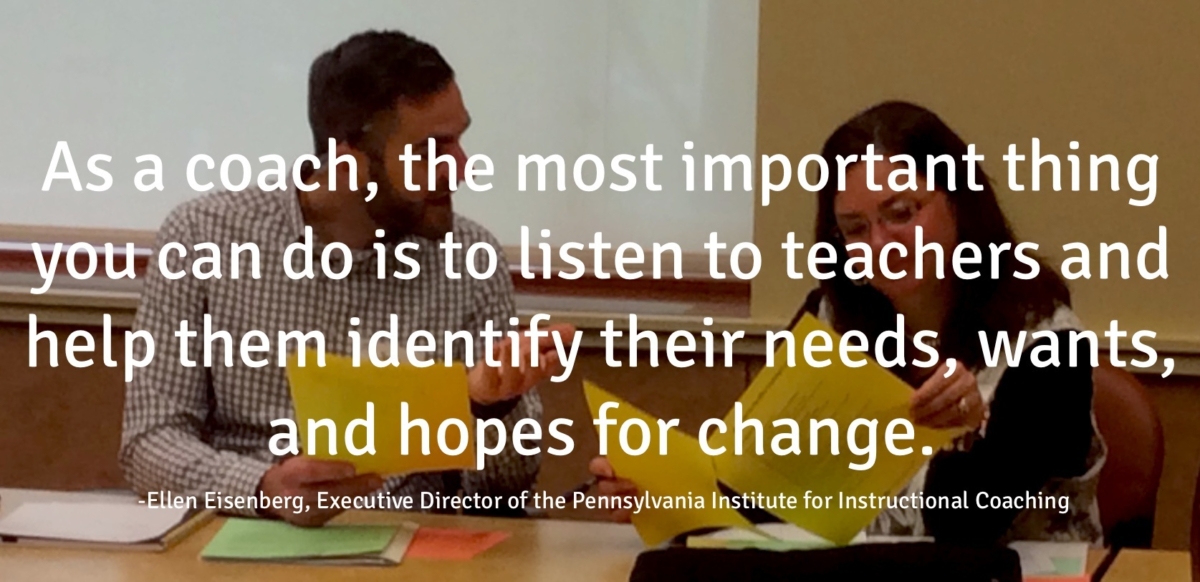


The summer is over, but if you’re like me, you’ve thought all summer long about how to help teachers increase student engagement, build their repertoire of teaching skills, and refine your own coaching practices at the same time.
August is a great time to think about effective instructional practice, the variety of ways to help teachers meet the needs of their students, and how your coaching practices need to be differentiated according to your teachers’ needs. How the coach begins the process is dependent upon two things: is the coach new to the school, or is this the next year of a coaching implementation? Either way, how coaches start the ball rolling and galvanize the teachers as the year begins is critical to a smooth operation.
As a coach, the most important thing you can do is to listen to teachers and help them identify their needs, wants, and hopes for change.
This is the “no-judgment zone”; that is, you are there to give encouragement and help each teacher move forward in his/her practice, one conversation at a time.
A coach’s role is to help teachers become more reflective practitioners and to think about their thinking in ways that will help them make changes to their practice. Teachers need to make time to talk about teaching and learning and not try to squeeze in really important conversations in the few minutes they pass each other in the hallways. They need time to meet, think aloud, practice, and then reflect about how students learn. The coach needs to make those opportunities for collaboration a reality, not just wishful thinking.
The 10-Step Program for Coaches:
- Collect some data around what teachers want to know and learn more about.
- Plan small-group mini professional learning sessions on topics of interest generated from the collected data.
- Provide multiple opportunities for teachers to meet, talk, and work together in a non-evaluative environment.
- Help teachers connect with each other, co-work on shared topics of interest, and collaborate with each other to reach goals.
- Make deliberate plans to work one-on-one and in small groups to build on the previous year’s school successes, e.g., how can we expand what worked well last year and collectively problem-solve around what didn’t?
- Organize small groups around the common core elements and share ideas for teaching and learning.
- Be positive and respectful; honor the teachers’ voices and expertise.
- Model that reflection, feedback, and quality questioning are essential to changing practice.
- Be a learner alongside your teaching colleagues.
- Promote literacy as a process involving every teacher and content area.
Remember the Role of the Coach
As Joellen Killion states, coaches are “catalysts for change” and are “visionaries who are never content with the status quo but rather always looking for a better way.” As you listen to your teaching colleagues, remember that your role is to ask questions that generate thought-provoking conversations and which lead to improved practices. Coaches are not the experts who know the answers; coaches help their teaching colleagues continually refine their practices by asking questions, expanding their tool kits, and guiding them to take ownership of their learning.
{{cta(‘aff0699e-2d29-45d5-accf-60ab441f603f’,’justifycenter’)}}
About our Guest Blogger
Ellen Eisenberg is the Executive Director of the Pennsylvania Institute for Instructional Coaching (PIIC). PIIC, a partnership of the Annenberg Foundation and the Pennsylvania Department of Education, is a statewide resource for developing and supporting consistent, high-quality instructional coaching in Pennsylvania schools.
{{cta(‘352a410e-db79-4f33-a482-d301e8041965’)}}
Stay Connected
News, articles, and tips for meeting your district’s goals—delivered to your inbox.








